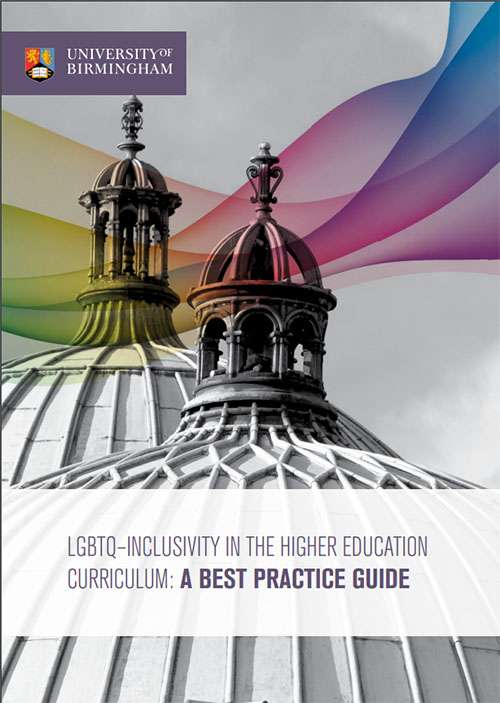LGBTQ-inclusion in higher education
The overarching goal of the project has been to identify and develop best practice on LGBTQ inclusion in higher education – with a focus on teaching and learning.
The first year of the project focused on data gathering – conducting a literature review, having a series of fact-finding conversations with key people within the University and conducting a survey with staff and students (to which we received over 1000 responses). The second year of the project focused on sharing the findings and exploring challenges with staff and students at a disciplinary level (i.e. science, humanities, vocational degrees).
This resulted in the publication of a best practice guide, which was launched at the 1st International Conference on LGBTQ inclusivity in Higher Education.
Following on from the publication of the best practice guide, we have worked further to develop good practice in embedding LGBTQ inclusivity into the curriculum. We identified two key barriers to sustaining LGBTQ inclusivity:
- The reticence of colleagues to engage with LGBTQ issues in the curriculum, despite their commitment to inclusivity, because of uncertainty about the best way to do so.
- The difficulty faced by colleagues and students in technical and science based subjects where humanities issues are not easily addressed within the curriculum.
Therefore we developed two related strands of work focused on students and staff:
Students: recognising that for some subjects it was extremely difficult to address the ‘content’ domain of inclusivity (see best practice guide for a description of the three domains and the different levels of inclusivity), we have developed a 20 credit module that can be accessed by first year undergraduate students (known as a ‘Widening Horizons’ module) ensuring that all students, whatever their discipline, have opportunities to include the study of gender diversity and sexual diversity within their learning.
Staff: We are working both with new and probationary teaching staff through teaching development to explore LGBTQ inclusion, and we are developing and piloting an LGBTQ Advocate scheme – to train staff (whether they identify as LGBTQ or not) to be a point of contact and support for students, and other colleagues.
Best Practice Guide

Funding
Two projects, Towards an LGBTQ-inclusive curriculum and Sustaining an LGBTQ-inclusive curriculum have been funded by the Educational Enhancement Fund at the Higher Education Futures Institute over 4 years (2014-2018).
The team
This team brings together a range of colleagues from across the University of Birmingham. The team demonstrate what can be achieved when staff and students work together to enhance the quality and inclusivity of Higher Education, learning from each other and appreciating the skills which each bring to the experience. It includes:
- Dr Nicola Gale – Nicola is a health sociologist with particular interests in health care practice.
- Dr Nicki Ward – Nicki is a qualified social worker and social work lecturer. Nicki has a particular interest in identity, diversity and intersectionality.
- Sean Russell – Sean is a freelance Education, Careers Consultant and Coach who specialises in Higher.
- Ross Strong – Ross joined the team as an UG student. He subsequently graduated and became the University of Birmingham Guild Welfare Officer.
- Shardia Briscoe-Palmer – Shardia is a Post Graduate Research and Research Assistant. Shardia has over 13 years’ experience working with young people on political and social issues.
 Above: Core project team (l-r): Sean Russell, Ross Strong, Shardia Briscoe-Palmer, Nicki Ward, Nicola Gale.
Above: Core project team (l-r): Sean Russell, Ross Strong, Shardia Briscoe-Palmer, Nicki Ward, Nicola Gale.
We have worked directly with over 200 colleagues at the University to develop their practice in this area. Since publication of the good practice guide we worked with 13 institutions nationally and internationally to develop their work in relation to the LGBTQ inclusive curriculum. The work led to the establishment of an international network for those interested in LGBTQ inclusivity in Higher Education and the First International Conference on LGBTQ Inclusivity held in September 2016.
Events
3rd International Conference in LGBTQ inclusion in higher education (to be held at the University of Birmingham, Sept 2018, dates to be confirmed).
Responses to the work
"..we piloted the Ward-Gale framework in a University wide workshop and found it to be an asset-based and evidence-based tool for developing out education provision and student experience’
Professor Trish Hafford –Lectchfield, University of Middlesex
"This work acknowledges the complexity of the HE environment …(t)he best practice guide will support colleagues to be inclusive about LGBTQ identities in their teaching practice and to feel confident in making gender and sexual diversity visible within the curriculum."
Sheena Griffiths, Equality and Diversity Adviser (Engagement), University of Birmingham
In the media
HEFi Micro-CPD on making the curriculum more LGBTQ inclusive (22/01/18)
Equality Challenge Unit Best Practice Case Study (02/06/2017)
The Conversation: Why LGBTQ inclusivity still matters in higher education (17/03/17)
Launch of Best Practice Guide (Press Release – 01/03/17)
1st International Conference on LGBTQ inclusion in Higher Education (11/10/16)
PinkNews – launch of the LGBTQ inclusive curriculum project (15/10/14)
Keep in contact
Twitter: @nickijward; @drnicolagale; @LGBTQinHE
Emails: n.j.ward@bham.ac.uk; n.gale@bham.ac.uk; sean@getoutstayout.org.uk.